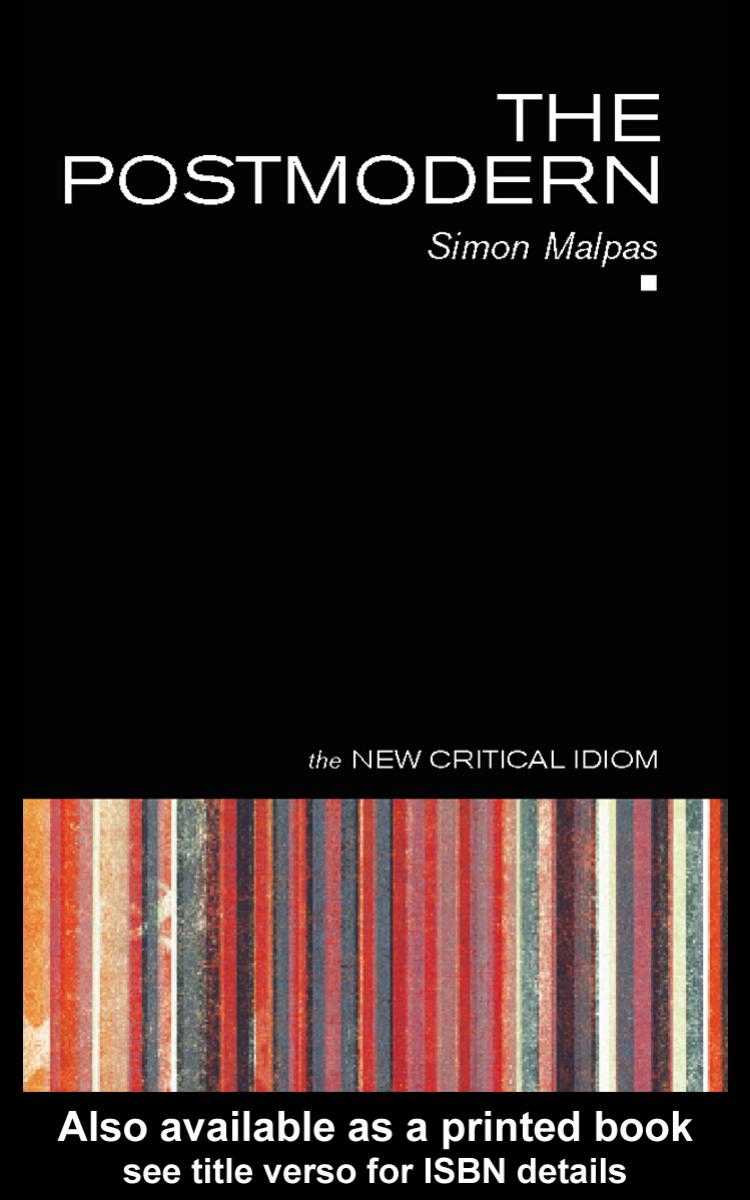The Postmodern by Simon Malpas

Author:Simon Malpas
Language: eng
Format: mobi, pdf
Tags: Language & Literature
Published: 2011-05-06T16:57:52.703454+00:00
4
HISTORY
The second key aspect of modernity that Habermas’s discussion in Chapter 2 focused on is the notion of historical development and progress towards more rational and just forms of social organisation and cultural interaction. This is one of the guiding ideas of modern thought, and is one that has been a key category for postmodern critics to question. Ideas of history have already been touched upon in other arguments explored so far. Chapter 2 also introduced Berman’s analysis of the modern as a resolutely developmental world-view in which progress transforms every aspect of experience as new social and economic organisations generate new forms of identity and community at a rapidly increasing pace.
We have also seen some of the postmodern responses to this idea of historical progress. Chapter 1 introduced Jameson’s idea of postmodern depthlessness and the weakening of a sense of history, in which any idea of continuity with and development from the past has evaporated, and Hutcheon’s notion of historiographic metafiction by which literary texts set out to challenge the received meanings of past events. Chapter 2
discussed Lyotard’s arguments about the destruction of the modern grand narratives that identify and shape historical progress. Each of these questions the idea of development and progress that underlies the modern sense of historical change. Key questions that were left unanswered in all of these modern and postmodern arguments, however, include the following: what is at stake in this focus on historical progress? Why is history so important for both modern and postmodern thought? What sorts of history do they present? And how do these notions of history relate to the everyday experience of individuals and the cultures and societies they inhabit?
The claim made by critics such as Berman, Lyotard, Hutcheon, Jameson and Habermas is that with the advent of modernity history takes on a whole new meaning and value. This is not, of course, to argue that no histories were written before the onset of modernity. History has been an object of study from the very earliest societies, and chronicles noting the key events of their various cultures, from wars to the yields of harvests, were kept even in ancient times. The Greek writer Herodotus ( c. 484–425 BCE) has often been referred to as the ‘father of history’, and his works chart the conflicts and adventures of Greek society during their encounters with the various cultures that surrounded them. He provides a catalogue of incidents, characters and interactions that covers a period of many years, and yet what he produces is very different from the historical thinking that underpins modernity. The philosopher Aristotle (384–322 BCE) characterises the ancient Greek notion of history by differentiating it from poetry in the following manner in the Poetics: The difference between the historian and the poet is not that one writes in prose and the other in verse. . . . The difference is that one tells of what has happened, and the other of things that might happen. For this reason poetry is something
Download
This site does not store any files on its server. We only index and link to content provided by other sites. Please contact the content providers to delete copyright contents if any and email us, we'll remove relevant links or contents immediately.
| Ancient & Classical | Arthurian Romance |
| Beat Generation | Feminist |
| Gothic & Romantic | LGBT |
| Medieval | Modern |
| Modernism | Postmodernism |
| Renaissance | Shakespeare |
| Surrealism | Victorian |
4 3 2 1: A Novel by Paul Auster(12352)
The handmaid's tale by Margaret Atwood(7726)
Giovanni's Room by James Baldwin(7297)
Asking the Right Questions: A Guide to Critical Thinking by M. Neil Browne & Stuart M. Keeley(5734)
Big Magic: Creative Living Beyond Fear by Elizabeth Gilbert(5721)
Ego Is the Enemy by Ryan Holiday(5386)
The Body: A Guide for Occupants by Bill Bryson(5064)
On Writing A Memoir of the Craft by Stephen King(4909)
Ken Follett - World without end by Ken Follett(4703)
Adulting by Kelly Williams Brown(4549)
Bluets by Maggie Nelson(4533)
Eat That Frog! by Brian Tracy(4497)
Guilty Pleasures by Laurell K Hamilton(4417)
The Poetry of Pablo Neruda by Pablo Neruda(4077)
Alive: The Story of the Andes Survivors by Piers Paul Read(4009)
White Noise - A Novel by Don DeLillo(3987)
Fingerprints of the Gods by Graham Hancock(3974)
The Book of Joy by Dalai Lama(3958)
The Bookshop by Penelope Fitzgerald(3826)
